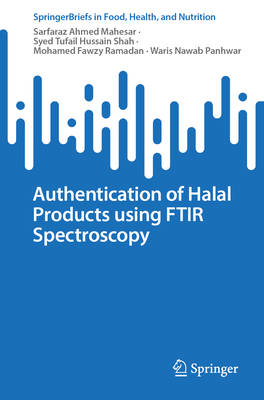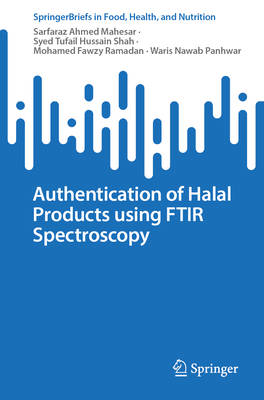
Bedankt voor het vertrouwen het afgelopen jaar! Om jou te bedanken bieden we GRATIS verzending (in België) aan op alles gedurende de hele maand januari.
- Afhalen na 1 uur in een winkel met voorraad
- In januari gratis thuislevering in België
- Ruim aanbod met 7 miljoen producten
Bedankt voor het vertrouwen het afgelopen jaar! Om jou te bedanken bieden we GRATIS verzending (in België) aan op alles gedurende de hele maand januari.
- Afhalen na 1 uur in een winkel met voorraad
- In januari gratis thuislevering in België
- Ruim aanbod met 7 miljoen producten
Zoeken
Authentication of Halal Products Using Ftir Spectroscopy
Sarfaraz Ahmed Mahesar, Syed Tufail Hussain Shah, Mohamed Fawzy Ramadan, Waris Nawab Panhwar
€ 76,45
+ 152 punten
Omschrijving
For Muslims, Halal food is crucial, and regulations are in place to protect quality and authenticity, including methods for keeping out forbidden elements. The identification and elimination of non-Halal contents is the basis of the Halal analyses, promoting the development of analytical techniques for Halal product authentications. Gas chromatography-mass spectroscopy (GC-MS), electronic nose (e-nose), Fourier transform infrared (FTIR), high-pressure liquid chromatography (HPLC) and real-time polymerase chain reaction (RT-PCR) are some of the most popular techniques used in Halal food analysis. Due to its satisfactory results, straightforward approach and lack of damaging preparation, FTIR spectroscopy, combined with chemometrics, is an excellent technique for analyzing halal food. Authentication of Halal Products using FTIR Spectroscopy aims to widen the concept of Halal food by covering FTIR in conjunction with chemometrics for Halal authentication. This combination has never been discussed before in such detail, providing the latest connection between Halal analysis and authentication plus providing comprehensive coverage on FTIR and chemometrics for Halal authentication. Halal authentication of meat, fat, oil, consumer products, and pharmaceuticals are covered plus Halal production, processing, ingredients, storage, logistics methods, and global perspective.
Specificaties
Betrokkenen
- Auteur(s):
- Uitgeverij:
Inhoud
- Aantal bladzijden:
- 184
- Taal:
- Engels
- Reeks:
Eigenschappen
- Productcode (EAN):
- 9783031927720
- Verschijningsdatum:
- 2/10/2025
- Uitvoering:
- Paperback
- Formaat:
- Trade paperback (VS)
- Afmetingen:
- 157 mm x 236 mm
- Gewicht:
- 312 g

Alleen bij Standaard Boekhandel
+ 152 punten op je klantenkaart van Standaard Boekhandel
Beoordelingen
We publiceren alleen reviews die voldoen aan de voorwaarden voor reviews. Bekijk onze voorwaarden voor reviews.









